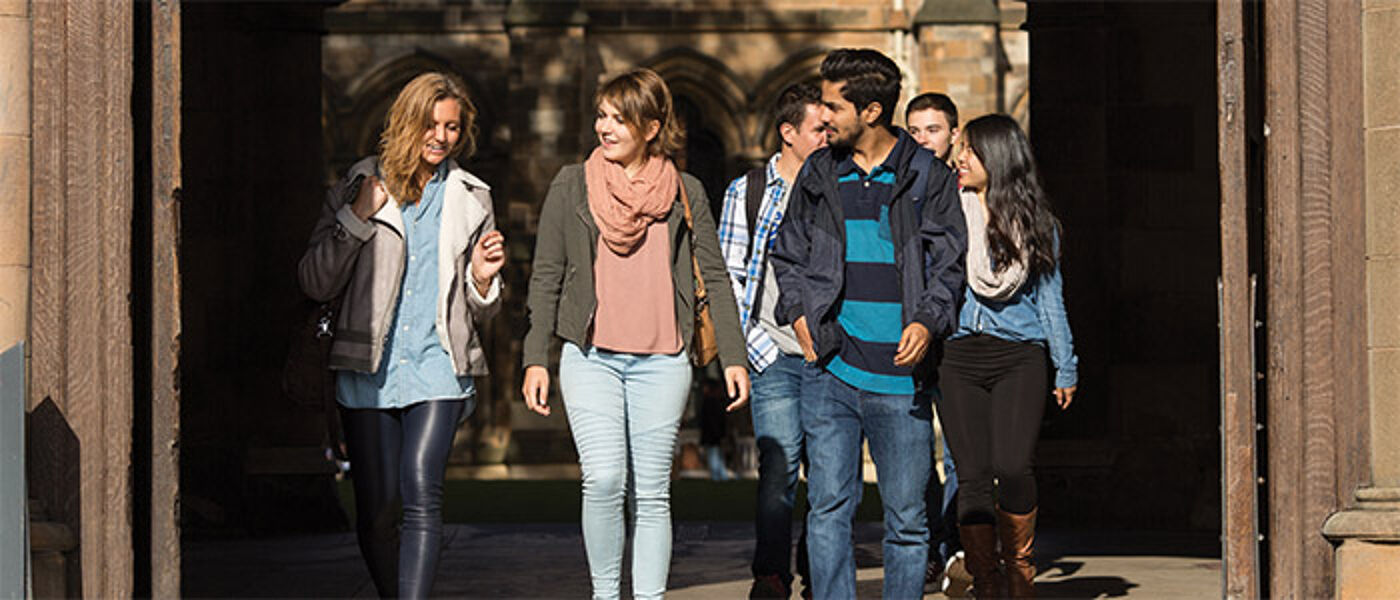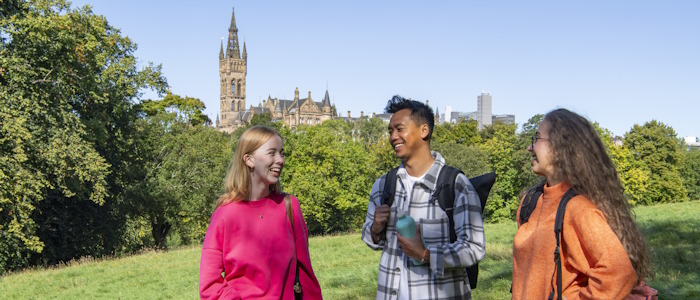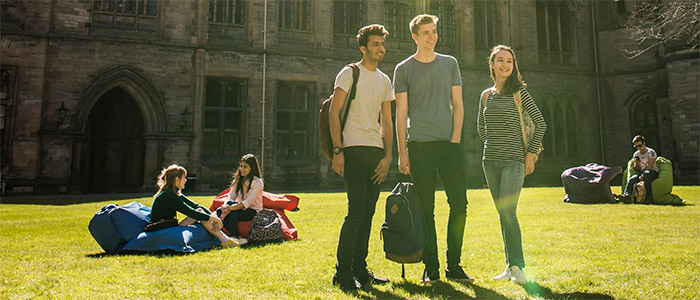Celtic Civilisation MA

Studying Celtic Civilisation immerses you in the history of the Celts, the development of their societies, their literature, material culture, art and religion, from earliest times on the European continent to the present-day British Isles.
You will have the opportunity to study the medieval and modern cultures of Celtic speaking peoples, with scholars at the cutting edge of research, as part of a joint degree, with no requirement to learn a Celtic language.
The University has active study abroad relationships with Trinity College Dublin and universities in North America and Australia offering Celtic courses.
- September start
- Session dates
- This programme can only be taken as joint honours
- Glasgow: Gilmorehill campus
- Degree options
- Study abroad available
Programme structure
Year 1
You will explore the history, culture and religious beliefs of the ancient Celts who, at their maximum extent, occupied much of Western and Central Europe, from Britain and Ireland in the west, to Asia Minor in the east. You will also examine the society, art and literature of the early Christian Celts of Britain and Ireland.
Year 2
You will study the most important aspects of the histories, institutions, cultures and literatures of Scottish Gaelic, Irish and Welsh societies in two courses:
- Celtic societies, 1066 – 1603 is mainly concerned with the period of conquest and cultural change in
the Middle Ages - Celtic societies and the modern world traces the relationship between Celtic language communities and the British state from 1750 to the present day.
You will also study other subjects in years 1 and 2: see Flexible degrees.
Years 3 and 4
If you progress to Honours (years 3 and 4) you will have the opportunity to deepen your understanding of specific aspects of Celtic history, literatures and cultures, such as belief and culture in early medieval Ireland and Gaelic Scotland, Celtic place-names of Scotland, early Gaelic literature, Celtic art, medieval Welsh literature and Gaelic folklore.
You will have access to a series of courses on Celtic history and culture on topics such as medieval Ireland, the Northern Britons and the Picts.
You will also write a dissertation, allowing you to research a relevant topic of your own choosing and to develop a capacity to work independently.
Course details
Programme alteration or discontinuation
The University of Glasgow endeavours to run all programmes as advertised. In exceptional
circumstances, however, the University may withdraw or alter a programme. For more information,
please see: Student contract.
Our international links
There are opportunities open for you to study in an institution outside the UK. The University has active study abroad relationships with Trinity College Dublin and universities in North America and Australia offering Celtic courses.
Entry requirements
for entry in 2025
You should refer to the entry requirements for both subjects and the degree award when applying for a joint honours degree programme. The higher entry requirement (where applicable) and additional requirements must be met for both subjects.
Summary of entry requirements for Celtic Civilisation
SQA Higher entry requirements
- BBBB is the minimum requirement from S5 to be reviewed for an S6 offer
- Offers are not guaranteed to applicants who meet the minimum from S5
- Typically offers will be made at AAAAA by end of S6. B at Advanced Higher is equivalent to A at Higher
- Additional requirements: Higher English and a Higher Humanities subject at AA. (AB or BA may be considered).
SQA Higher adjusted entry requirements* (by end of S5 or S6)
- MD20: BBBB (also other target groups*)
- MD40: AABB*
- Additional requirements: Higher English and a Higher Humanities subject. Successful completion of Top-Up or one of our Summer Schools.
* See Access Glasgow for eligibility.
A-level standard entry requirements
- AAB – BBB
- Additional requirements: one A-level Humanities subject.
IB standard entry requirements
- 34 (6,5,5)
- Additional requirements: English HL6 or Humanities HL6 with English SL6.
Note: No prior knowledge of a Celtic language is required and all reading materials will be in English.
Entry requirements for advanced entry to Celtic Civilisation
Applicants who achieve exceptional grades in their Advanced Highers, A-levels or International Baccalaureate may be considered for advanced entry, meaning that an Honours degree can be completed in three years instead of the normal four years, or four years for five-year integrated Masters programmes. Not all joint honours subjects are available for advanced entry and applications to joint honours programmes will be considered on a case-by-case basis.
Choose point of entry 2nd year on your UCAS application to indicate you wish to be considered for advanced entry.
SQA Higher requirements for advanced entry
- Three Advanced Highers at Grades AAA attained in one exam year and at the first attempt. Subjects must be relevant to the courses to be taken at Level 2.
A-Level requirements for advanced entry
- A*A*A
IB requirements for advanced entry
- 38 points
Admissions guidance
English language
For applicants from non-English speaking countries, as defined by the UK Government, the University sets a minimum English Language proficiency level.
English language requirements
Career prospects
Recent graduates have entered a range of careers including primary and secondary teaching; work with museums and government heritage bodies; publishing and book marketing. Others have gone on to further study and to successfully pursue a career in research and academic work.
Degrees and UCAS codes
Celtic Civilisation can only be taken as a Joint Honours degree.
When applying you will need to know the UCAS code for the subject or subject-combination that you wish to apply to:
MA (Hons)
Fees and funding
Tuition fees
How and when you pay tuition fees depends on where you’re from: see Tuition fees for details.
Scholarships
The University is committed to supporting students and rewarding academic excellence. That's why we've invested more than £1m in additional scholarship funding in recent years.
World Changers Global Excellence Scholarship
World Changers Glasgow Scholarship UG (EU)
World Changers RUK Excellence Scholarship
World Changers RUK Access Bursary
James McCune Smith Undergraduate Scholarship
Care Experienced and Estranged Student Bursary
Beatrix Whistler and James McNeill Whistler Scholarship
Beaconhouse Schools
Undergraduate Talent Scholarships
Cowrie Foundation Scholarship
The Clan Gregor Society Prize
The Dima Alhaj Scholarship
Sanctuary Scholarships
Travel Bursary for Forced Migrants
Glasgow Highland Society Scholarship
The scholarships above are relevant to this programme. For more funding opportunities search the scholarships database
How to apply
Full-time students must apply through the Universities & Colleges Admissions Service (UCAS).
SQA applicants who are eligible for our Widening Participation programmes are encouraged to participate in one or more of these programmes, including Summer School, to support your application and the transition to higher education.
International students to Arts, Engineering, Law, Nursing, Science, and Social Sciences can also apply using The Common Application: however, if applying to more than one UK university, we recommend using UCAS. Applications to Dentistry, Education, Medicine, and Veterinary Medicine must be made through UCAS.
Application deadlines
- 15 October: if including Dentistry, Medicine, Veterinary Medicine or also applying to Oxford or Cambridge
- 29 January: all other UK applicants (unless otherwise stated on the UCAS website)
- 30 June: international students.
We do not usually accept any applications after these deadlines.
It's your responsibility to ensure the accuracy of your application before submission. Requests to correct application content, change degree programme or change college of entry, will not be accepted after these deadlines. This policy is in place to ensure fairness and consistency to all applicants, and no exceptions will be made.
- Apply at www.ucas.com or through your school or college
- Contact UCAS on 0871 468 0468
- Apply at commonapp.org (international students to certain areas only)
How to apply for Advanced Entry
Apply for year 2 (Y2) on your UCAS application. If the specific subject is unavailable for Advanced Entry or your application for year 2 entry is unsuccessful, you will be automatically considered for year 1 entry. You do not have to submit a separate UCAS application.





